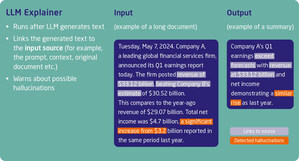NEC laboratories advances therapeutic cancer vaccine research with new AI model Attentive Variational Information Bottleneck
HEIDELBERG, Germany, July 27, 2023 /PRNewswire/ -- NEC Laboratories Europe and NEC Laboratories America have developed a new artificial intelligence (AI) model called Attentive Variational Information Bottleneck (AVIB), which advances the development of therapeutic cancer vaccines. AVIB builds on previous discoveries to predict the binding between different proteins and molecules, which is a crucial part in the human immune system's ability to recognize and fight cancer. More specifically, it allows biotechnologists to predict the binding between T-cell receptors and antigens presented on the surface of cancer cells.
NEC's immune profiling technology, NEC Immune Profiler, and NEC Neoantigen Prediction System use bioinformatics and machine learning to analyze the DNA and RNA of cancer patients to identify neoantigens originating from cancer mutations. Neoantigens can be used to develop personalized therapeutic cancer vaccines that teach the patient's immune system to recognize and kill cancer cells. However, not all neoantigens that are presented on the surface of cancer cells have the same probability of binding to T-cell receptors that trigger the immune response needed to destroy cancer cells.
Dr. Pierre Machart, Senior Research Scientist at NEC Laboratories Europe, explains: "Almost any neoantigen arising from cancer mutations has some potential to elicit an immune response and be used in the design of an immunotherapy cancer vaccine. But identifying the neoantigens that are most effective can be extremely challenging."
Given that T-cell receptors vary greatly, testing which neoantigens are recognized by T-cell receptors is an even more challenging problem. Dr. Anja Moesch, Research Scientist at NEC Laboratories Europe, said: "When it comes to cancer, it is essential to intervene as quickly as possible. Until recently, biotech companies would usually develop immunotherapies by testing in a wet lab which neoantigens are presented on the surface of a patient's cancer cells and if they could be recognized by the patient's T-cells." Machine learning approaches have helped automate this two-step process, but there are still large gaps in the capabilities of machine learning that prevent effective vaccines from being quickly created. Continues Moesch, "AVIB can help to close this gap, allowing biotechnologists to significantly reduce the time needed to develop personalized cancer immunotherapy."
Recent advances in immunotherapy have, in part, been driven by machine learning methods that can predict the presentation of neoantigens on the surface of cancer cells. However, progress slowed because machine learning models are unable to predict reliably what T-cell receptors would recognize neoantigens. That is due to the limited amount of publicly available training data for machine learning models and the high complexity of molecules that need to be analyzed.
AVIB represents a first step towards predicting the likelihood that T-cell receptors will recognize neoantigens on the surface of cancer cells. For cancer immunotherapy, this allows biotechnologists to better rank the most effective vaccine elements by considering the presentation of neoantigens on a patient's cancer cells and their binding with T-cells. Dr. Martin Renqiang Min, Department Head of Machine Learning at NEC Laboratories America, said: "By using AVIB, we can improve the ranking of neoantigens which constitutes a therapeutic vaccine formula. We can do this not only based on whether they are presented on the surface of cancer cells, but also based on the predicted probability that they will be recognized by the patient's T-cells. This can greatly improve the effectiveness of immunotherapy."
AVIB's ability to predict whether T-cells will recognize neoantigens also opens the door for potential T-cell therapy – considered a major advancement in immunotherapy. Using this approach, T-cells can be directly engineered with T-cell receptors to bind with neoantigens on a patient's cancer cells, triggering their destruction.
About NEC Laboratories America
NEC Laboratories America, Inc. (NEC Labs) is the US-based center for NEC Corporation's global network of corporate research laboratories. Their diverse research groups collaborate with industry, academia and governments to provide disruptive solutions to complex problems. A leader in the integration of IT and network technologies with more than 100 years of expertise, NEC provides a combination of products and solutions that cross-utilize the company's experience and global resources to meet the complex and ever-changing needs of its customers.
For more information, visit https://www.nec-labs.com.
About NEC Laboratories Europe GmbH
NEC Laboratories Europe research and develop cutting-edge technology to create innovative social solutions. Located in Heidelberg, Germany, major research areas of NEC Laboratories Europe include artificial intelligence, blockchain security, 5G and 6G networks, and IoT platforms. These technologies promote NEC Group solutions for a better society in the fields of digital health, safer cities, public services and communication infrastructure.
For more information visit https://www.neclab.eu.






Share this article